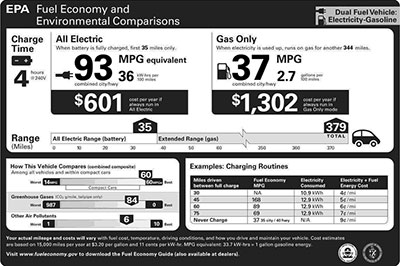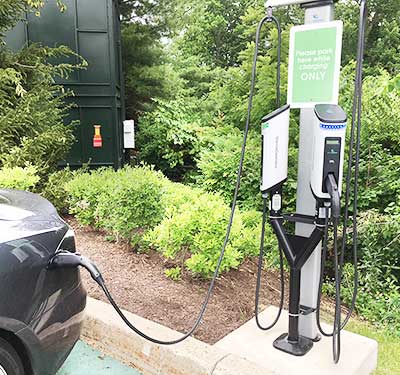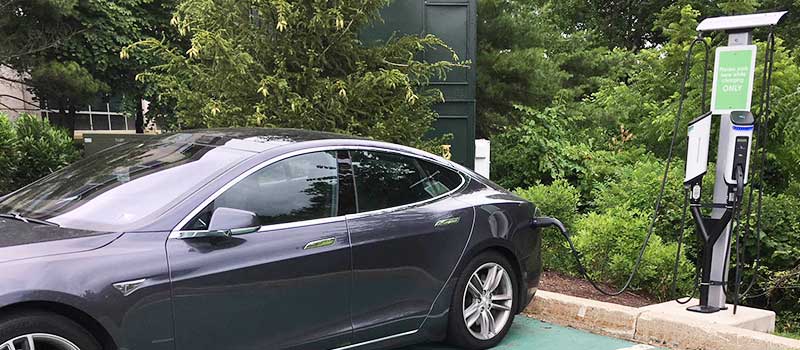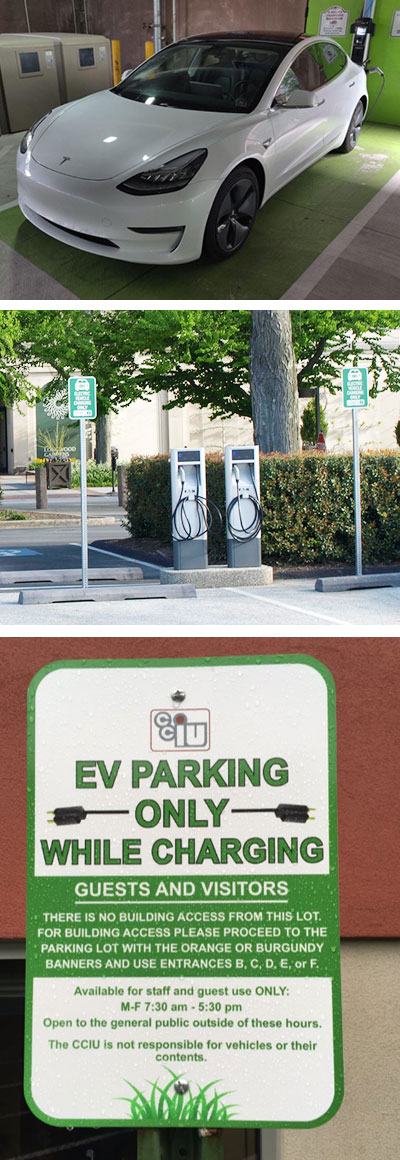

Inclusion of EV charging facilities may lead to increased consumer use of electric vehicles.
How it Works
In recent years EV ownership and interest has increased significantly. New federal tax credits authorized in 2022 will further incentivize EV purchase. These trends are not just driven by individuals — many municipalities and private sector companies are transitioning to electric fleet vehicles to meet cost savings and sustainability goals.
While fully electric EVs do not use gasoline, they still must be recharged through the local and regional electric distribution system. For most EV owners charging will occur predominantly at home or at work, so municipalities should support charging infrastructure at residential properties. EV use is also supported through resources that assist in locating recharging stations during longer trips.
Benefits
Reduced Pollution
The expansion of EV use reduces non-point air pollution and greenhouse gas emissions. The total energy needed for recharging an EV is less than that needed to power a gasoline powered vehicle over an equal distance. The reduction in carbon emissions would be even greater when EVs are charged from a utility grid using renewable energy sources.
Energy Conservation
When electric vehicles are recharged during off-peak times (such as at night) their use can both shift the demand away from gasoline and towards a more efficient use of electricity.
Efficient Future Installation
Anticipating future demands for recharging facilities during land development planning can make their installation less costly.
Greater Market Acceptance
Planning for more EV charging facilities can help create the infrastructure that can encourage their wider use.
Charging stations are a critical component of supporting EV use. Top to bottom: parking facility in West Chester; visitors' parking lot at Longwood Gardens; and the Chester County IU in Downingtown.
Get Started
Municipalities can help create conditions that can encourage the wider use of EVs by adopting supporting policies and regulations:
Encourage Wider Installation in Non-Residential Developments
Municipalities can offer incentives for the provision of these facilities in office, commercial, and multi-family developments. Municipalities can encourage the provision of electricity charging conduits to be installed under parking lots, which can facilitate their later provision without the need to excavate paved areas. Density bonuses or relief from other land development requirements could be offered for a combination of energy saving measures including the recharging stations.
Encourage Enhanced Electric Charging Capabilities
More opportunities can be created for EV owners to charge their vehicles if homes and businesses are equipped with charging circuits at the time of initial construction. The Pennsylvania Uniform Construction Code does not currently regulate EV recharging facilities or require their initial provision, but municipalities could encourage their installation by discounting part of the application fee for building permits or other incentives.
Amend Land Use Regulations
New types of land use and zoning categories may be needed to accommodate EV charging facilities. Consumers may require a facility where their vehicles can remain for a period of time as they recharge while drivers can take advantage of other activities on the site such as shopping, visiting a coffee shop, or participating in a recreational activity.
Regional Coordination
Municipalities can create joint training opportunities for building inspectors who inspect and approve EV facilities, and adopt uniform multi-governmental zoning, and subdivision and land development regulations for EV charging facilities.
Utilize Municipal EVs
Municipalities can lead by example and use EVs to replace conventional vehicles in their fleets.
Considerations
"Range Anxiety"
Some consumers are hesitant to buy fully-electric vehicles due to concerns about being stranded without access to charging stations. Smart phone apps available for locating the nearest charging stations can help to ease this anxiety. (See Resource Links.)
Availability of Recharge Stations
Related to "range anxiety" is the availability of publicly accessible recharge stations. Most recharging is conducted at individual homes, however, public recharging stations and their facilities are becoming more commonplace and are more easily found through smart phone apps.
Vehicle Price
High battery costs make EVs more expensive than comparable traditional fuel vehicles, although initial purchase costs may be reduced by tax incentives and rebates. Prices are expected to fall as technology continues to improve and more EV options become available.
Long Recharge Times
EVs can require long recharge times depending on the charging systems. Level one charging systems provide 3-5 miles of driving range per hour of charge, level 2 chargers provide about 10-25 miles of ranger per hour, and DC fast charging stations provide 100-250 miles of range in 30 minutes.
Funding Limitations
The ability to install EV recharging facilities in public locations may be limited by available funding.
Parking and Charging Facilities
Charging stations and parking locations need to be in proximity, and EV owners may therefore indirectly receive preferential parking locations. This may not appear to be equitable. Vehicles with completed charges should also be moved to free the charger for another vehicle, which may result in enforcement difficulties.
Model Ordinances
New Jersey
The State of New Jersey created a model ordinance template for the implementation of electric vehicle charging stations after Governor Murphy signed into law a requirement that "Electric Vehicle Supply/Service Equipment (EVSE) and make-ready parking spaces be designated as a permitted accessory use in all zoning or use districts." The ordinance also establishes associated installation and parking requirements.
Temple University
The university created a model ordinance guide containing in-depth guidance regarding considerations and policy for the integration of electric vehicle charging stations.
Ordinance Examples
Phoenixville Borough
The borough's subdivision and land development ordinance includes design standards for parking lots that include electric vehicle parking and charging requirements.
Pittsburgh, PA
The city's Electric Vehicle Charging Ordinance establishes standards for electric vehicle charging stations in city-owned parking lots.
Philadelphia, PA
Title 14-803.6 of the city's zoning ordinance requires, "Any development, as defined… that contains a residential use and is providing 20 or more parking spaces in connection with the development shall provide electric vehicle parking spaces in accordance with Table 14-803-3."
Arlington, VA and Fairfax County, VA
Arlington and Fairfax County have made official zoning interpretations allowing electric vehicle charging stations as an accessory use to office and residential type uses. Parking spaces allotted for electric vehicle charging stations which meet the dimensions of a standard parking space are encouraged and are counted as a required parking space.
Middletown, CT
Per zoning ordinance Section 40.02.01, "Any new development that requires 25 or more parking spaces, as calculated by Section 40.04 of these regulations, shall have a minimum of 1 charging space or 3% of the total number of spaces allocated to Electric Vehicles (EV's) (whichever is greater) and must have a Level 2 or 3 charging station/connection per EV parking space. Parking spaces shall be well lit and shall be for public use."
Methuen, MA
Section V-T of their zoning ordinance contains a number of standards for electric vehicle charging stations. This ordinance has a different approach in that it sets a maximum total number of EV spaces versus a minimum and does not count charging stations as full parking spaces.



